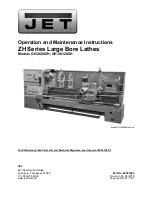
34
Work preparation / operation
Before each use, check the following:
• Proper function of the on and off button, incl. the
emergency switch.
• Locked disconnected protective equipment
by gradual opening of every separating protective
equipment to be able to turn the machine off and
checking that the machine cannot be turned on
whenever the protective equipment is open.
• Brake
by means of a function test to establish whether
the braking process takes place within the speci-
fied braking time and, if the machine is fitted with
a mechanical brake, that the brake must be tested
each time the overload guard is tripped.
• Recoil risk
at least once per shift by a visual inspection to
establish that they are in good working order, for
example, that the contact surface has not been
damaged by impacts and that the grabs fall back
without hindrance due to their own weight.
• Planing blades
for signs of damage and to ensure they are positi-
oned correctly.
The machine may only be used if all these conditions
are satisfied.
Use only well sharpened and maintained blades. Use
only blades that are designed for the machine.
Use pusher wood or sticks which are in perfect condi-
tion for machining short workpieces.
Connect the machine to a dust and chip extractor.
Check that the stop is secure before starting the
machining work.
Ensure that you can maintain your balance at all
times. Stand to the side of the machine. Whilst the
machine is running keep your hands at a safe distance
from the cutting roller and from the point at which
the chips are discharged.
Do not start the planing work until the cutting roller
has reached the required speed.
Also ensure that the workpiece does not contain any
cables, wires, cords or the like. Do not machine any
wood which has lots of knots or knot holes.
Secure long workpieces to prevent them tipping over
at the end of the planing process. Use roller stands, for
example, or similar devices for this purpose.
Removing sawdust and chippings from the machine
when running is strictly prohibited.
Switch off the machine immediately it is jams. Pull out
the mains plug and remove the jammed workpiece.
Set the smallest cutting size after use to prevent the
risk of injury.
Maintenance
Unplug the machine before any work on it.
Prior to every use, visually check the machine to rule
out any defects, in particular on the power cable and
the plug.
The machine must not be used under any circum-
stances if the machine or the safety devices are
damaged.
Repairs and works specified in these Instructions may
only be performed by qualified authorised staff.
Use only original accessories and original spare parts.
At all times, keep the machine, ventilation slots, in
particular, clean. The sawdust ejection and/or dust
exhauster should be cleaned at regular intervals.
Never spray water on the machine!
Only a regularly maintained and treated appliance
can serve as a satisfactory aid. Insufficient mainte-
nance and care can lead to unforeseen accidents and
injuries.
Never clean the machine and its components with
solvents, flammable or toxic liquids. Us only a damp
cloth making.
Apply environment-friendly oil to all moving parts.
If necessary, a list of spare parts can be found at www.
guede.com.
Disposal
Any damaged or disposed devices must be
delivered to appropriate collection centres.
Transport packaging disposal
The packaging protects the machine against damage
during transport. Packaging materials are usually
chosen based on environment aspects and waste
treatment principles and are therefore recyclable. Re-
turning the packaging into material circulation saves
raw materials and reduces waste production. Parts of
packagings (e.g. foils, styropor®) can be dangerous
for children.
Risk of suffocation!
Keep parts of the packagings out of reach of children
and dispose them as soon as possible.
ENGLISH
DEGB
GB
55056_55098_Hobel_1-2.indd 34
08.04.15 09:37




































